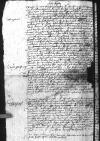Uns ist gestrigs tags E(wer) H(erlichkei)t schreib(e)n / neb(e)n ko(nigliche)r co(m)mission(n) und andren briven, / die wir hie bey widerschick(en), / geword(en), / aus welchen wir E(wer) H(erlichkei)t wolbedochte meynung / wol hab(e)n eingenomen(n). / Woruff wir die citation (/ weil sich / ausgeslag(en) den vortrag / die Lisma(n)nyn(n) zum hidden by binding⌈[m]m hidden by binding⌉ rechte czeut /) noch laut ko(nigliche)r co(m)mission hab(e)n lossen(n) schreib(e)n, die wirt E(wer) H(erlichkei)t den superinscribed⌈denden superinscribed⌉ ander(e)n h(e)rn co(m)missarien on the margin⌈co(m)missarienco(m)missarien on the margin⌉ zu besiglen(n), / und weiter zu antwort(e)n / wol wirt wissen zu bestellen(n). / Wie E(wer) H(erlichkei)t der zceit gedencke uff superinscribed⌈uffuff superinscribed⌉ unser(r) ⌊lieb(e)n frawen(n)⌋ geburt feir zu leg(en), / beduncket uns, / von weg(en) der mosterung, die bald darnoch sol gehald(en) werd(en), / unbekuen, / vorsehen(n) uns, / die stelle und tag in der citacion geseczt / E(wer) H(erlichkei)t nicht werd ungeleg(en) sein. Was den gebott briff anghet, / achten wirs, / wol s ane sverheit wirt sein zuvorleg(en), / nicht allein des sigels halb(e)n, / das alle wird hidden by binding⌈[d]d hidden by binding⌉ seinen(n) nhamen sold mit brinng(en), / und nicht worte hab(e)n, die darzu superinscribed in place of crossed-out zum sigel⌈zum sigel darzu darzu superinscribed in place of crossed-out zum sigel⌉ nicht gehoren(n), / sonder ouch, / das die zceuge vordochtlich sein, / die [...] hidden by binding⌈[...][...] hidden by binding⌉ werd(en) angeczeigt, obs pawren(n) oder burger sein, / ouch nicht melden, in welchem ort oder stat solche ehe sey gemacht wor vater und mut hidden by binding⌈[t]t hidden by binding⌉ter gewont vortrawt / und ire kinder gebor(e)n und erczogen superinscribed in place of crossed-out sein, welch⌈sein, welch und erczogen und erczogen superinscribed in place of crossed-out sein, welch⌉ hab(e)n.
Die vorschreibung im(m) statbuch zu ⌊Thorn(n)⌋, / nemlich die ane beywe hidden by binding⌈[e]e hidden by binding⌉sen und vorwillung ⌊Hans Muckers⌋ geschen, hot superinscribed in place of crossed-out kan⌈kan hot hot superinscribed in place of crossed-out kan⌉ nicht stelle, / wen[...] hidden by binding⌈[...][...] hidden by binding⌉ ouch mit dem(m) artikel des colmischn rechts, / den wir negst E(wer) H(erlichkei)t zu geschickt, / getilget. / Was die wilker zu Thorn(n) helt, / muss hidden by binding⌈[ss]ss hidden by binding⌉ vor den co(m)missarien(n) bewisen(n) werd(en). / So vil wirs vorsehen(n), halt wirs do vor, / das gemelte vorschreibung / und abrichtung der bruder, / der unelichen geburt nicht klein geczeugnis geb(e)n [...] paper damaged⌈[...][...] paper damaged⌉ne / und andren(n), / das ko(nigliche)r sachen zu gut mag komen(n), unser pflicht noch on the margin⌈unser pflicht nochunser pflicht noch on the margin⌉ wolt[...] paper damaged⌈[...][...] paper damaged⌉ nicht nochlessig gefund(en) werd(en) etc. /
Die rede mit h(ern) ⌊Zcemen paper damaged⌈[men]men paper damaged⌉⌋ ist uns gefall(e)n. / Wir wollen(n) uns darnoch wissen(n) zu halten paper damaged⌈[alten]alten paper damaged⌉. Vor on the margin⌈VorVor on the margin⌉ korczen tag(en) hab wir ein briff von im erh entfang(en), / [...] paper damaged⌈[...][...] paper damaged⌉ uns on the margin⌈unsuns on the margin⌉ zu wissen tag und stelle der co(m)mission, / daruff wir g[...] paper damaged⌈[...][...] paper damaged⌉, E(wer) / H(erlichkei)t wold unser(r) beygelegt schreiben(n) in zulossen komen(n), [...] paper damaged⌈[...][...] paper damaged⌉ die sache vorgenomen(n) sol werd(en), / weil ⌊Lucas Helm⌋ mit superinscribed in place of crossed-out ir⌈ir mit mit superinscribed in place of crossed-out ir⌉ k[...] paper damaged⌈[...][...] paper damaged⌉ thut rumen(n) / und ko(nigliche)r freiheit gebraucht, / sold er ouch pre[...] paper damaged⌈[...][...] paper damaged⌉ sein. / Ist ouch nottig, das imant des nhamen(n)s wider die [...] paper damaged⌈[...][...] paper damaged⌉nym dis written over e⌈ess written over e⌉se sache den co(m)missarien(n) vor brenge, / welchs E(wer) H(erlichkei)t paper damaged⌈[H(erlichkei)t]H(erlichkei)t paper damaged⌉ wirt wissen zu treffen(n), / die wir in aller seligheit gotlich(e)n gnad(en) befelen(n). /

 AAWO, AB, D. 7, f. 51v (t.p.)
AAWO, AB, D. 7, f. 51v (t.p.)